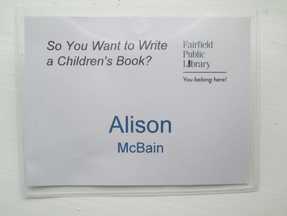|
I attended a free, all-day writer's conference yesterday at the Fairfield Public Library called, "So You Want to Write a Children's Book?" It was a who's who of Connecticut children's authors, illustrators, agents and publishers, from Rosemary Wells to Tony Abott, Christy Ottaviano to Anne Rockwell. There were about 100 attendees, and even more on the waiting list. Going into the conference, I knew next to nothing about publishing a children's book, and I walked away with my head stuffed full of information on the right (and wrong!) ways to go about it. Here's an overview, for those who weren't able to attend. 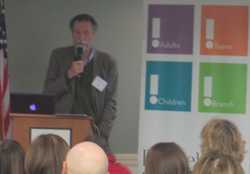 The keynote speaker was Tony Abbott, who filled in at the last minute for Patricia Giff. He had a droll sense of humor throughout his remarks, and he often had the audience laughing along with him. The theme of the introduction was "Writing from the Heart." He had some essential things to say about writers in general and children's writers in particular. He said, "Children's writers are ones who love language and story in such a deep way it's almost subconscious. . . . We have to breathe, we have to write - it's beyond our control." He said he's often asked why he writes for kids, as opposed to adults, and his answer was best elucidated by Laurie Halse Anderson: "Children are a much more important audience than adults." Tony found this concept revolutionary, but true - adults are beyond moulding, but children are malleable. "Their brains and hearts are open." Some tips he had to give for new writers: - "If you don't read Publisher's Weekly, you should at least subscribe to their free newsletter on kid's publishing." - "Find a good children's department in a bookstore, because it's marketing-oriented - that's what publishers are doing now." - "Write the story that needs to be written, and can only be written by you." 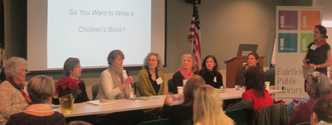 There were two panels next at the same time, and I chose to attend the picture book panel, "32 Pages to Paint a Story with Words and Pictures." In the photo from left to right are Anne Rockwell, Lizzie Rockwell, Jennifer Thermes, Deborah Freedman, Susan Hood, Karlin Gray, Tracy Newman and moderator MaryJo Scott. This panel contained an assortment of illustrators and writers, and some of whom were both. It was interesting to compare side-by-side the roles of writer versus illustrator, and how the two worked together to produce a whole book. Some advice from the panel: - Don't give up. "Just keep on knocking on the door, so to speak." (Mary Jo Scott) - Don't preach to kids. "If I'm excited by that person's story, that's going to come through to kids." (Jennifer Thermes) - "Picture books have to be almost like a film - they have to be visual. You have to see it pacing out visually. If you can't, the illustrator can't. If the illustrator can't, the child can't." (Anne Rockwell) - "The editor is neutral - it's not between two egos [author and illustrator]. You need that neutral ref." (Lizzie Rockwell) - "The biggest surprise [with picture books] is how much work goes into it after the writing is over." (Tracy Newman) - "What really shocked me was how long everything takes." (Susan Hood) - "Volunteer to read to kids. . . . You need to get back to the source. . . . You're not writing for yourself, you're writing for those little people, and they're wildly interesting and worthy of your attention." (Lizzie Rockwell) - "Don't stress about your first draft - give yourself permission for it to be crap. . . . No one else is going to see this." (Karlin Gray) - "Don't be in a rush. . . . It took me a really long time and I have no regrets about it - I grew as a person." (Deborah Freedman) - The computer is just another tool. It doesn't matter if the art is done traditionally or on the computer or both. Publishers just want beautiful art. (Jennifer Thermes) 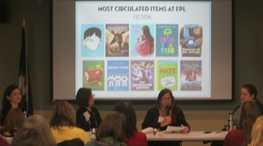 The library provided a delicious lunch, and while the audience and speakers refueled, the librarians took the stage in the panel, "Our Favorites and Why." In the photo from left to right, Stefanie Bergstrom, Helene Murtha, Judy Sparzo and the moderator, Nicole Scherer. Ms. Sparzo explained the role of the librarian in the children's library. "Our goal is to get your child to come in week after week, to the point any book is a good book." According to Ms. Murtha, there are two types of readers they see - the "voracious reader" and the "I don't care reader." A lot of the time, they have to figure out what the kids want to read and form a real connection. She added, "It's not a one-size-fits all." Top three books that each librarian recommended: Stefanie Bergstrom The Cow Loves Cookies by Karma Wilson The Terrible Two by Mac Barnett and Jory John All the Answers by Kate Messner Helene Murtha Use Your Imagination by Nicola O'Byrne Frindle by Andrew Clements A Tale Dark and Grimm by Adam Gidwitz Judy Sparzo Sick Simon by Dan Krall The Lion Who Stole My Arm by Nicola Davies The Boundless by Kenneth Oppel 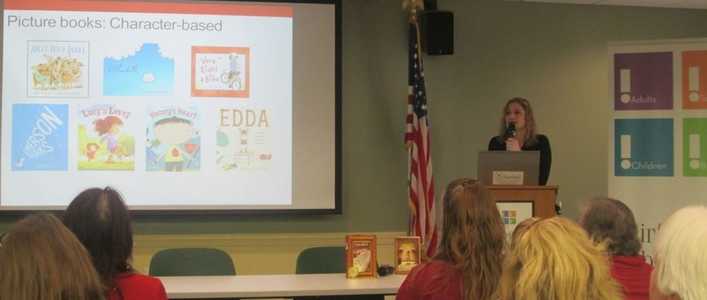 Christy Ottaviano came in to give us an overview of the publishing process from start to finish in "Behind the Scenes with 'Masterpiece': From Inception to Reception & Everything in Between." She has her own imprint called Christy Ottaviano Books under Henry Holt, which is part of Macmillan. She called herself a "generalist" in terms of publishing, meaning she does everything from nonfiction to fiction, ranging from picture books up to select YA. One of her most successful publishing stories was Elise Broach's book, Masterpiece. The basic process from start to finish was as follows: 1) Ms. Broach pitched the idea to Ms. Ottaviano. Ms. Ottaviano said that Ms. Broach had her attention at the first line of her pitch: "This middle-grade novel for ages 8-12 is a story about art and friendship, and the sacrifices required by both." 2) Ms. Broach wrote the book and emailed the first draft to Ms. Ottaviano. 3) Ms. Ottaviano wrote back editorial notes about the plot, language, and other overarching things (not a line-by-line edit.) 4) Ms. Broach revised and sent back the manuscript. Ms. Ottaviano had more suggestions, and then Ms. Broach sent back another revision. 5) After this revision, which was where she had a pretty finished draft, Ms. Ottaviano hired the artist for the book, Kelly Murphy. The artist had to have the final draft in order to start working on creating the characters. 6) The artist created character sketches, and the publisher talked to Ms. Murphy about revising them for two reasons: one, to fit in better with the writer's and publisher's idea of what the characters looked like, and two, to make the characters unique from all the other books out there. After a similar round of suggestions and revisions back and forth between the publisher and the artist, the characters were born. 7) Next was copyediting of the manuscript, fact checking, and working with a designer to finalize the interior of the book. There were different covers for the hardcover and for the paperback. The hardcover was more "literary" and formal, whereas the paperback was made to look more accessible to the reader. 8) Next, the publisher sent a "brag letter" - a letter to select reviewers and book sellers. This isn't done for every book, but for 1-2 particular books each year that they think are special. 9) Next was writing a discussion guide for classrooms. 10) Then the book received a number of awards and honors, including Publishers Weekly Best Children's Books of the Year, ALA Notable Children's Books, and the American Library Association Notable Children's Books. 11) Afterwards, the book hit the bestseller list. This isn't always necessarily the same thing as garnering a lot of attention from awards - it doesn't always mean that a well-received book in academic circles will do well publicly, but this one did. 12) The book was translated and sold around the world. Again, not all books translate well or are received well abroad, but the message in Masterpiece proved to be more universal. 13) Then came the audio book, spinoff books and finally, a movie. Some helpful tips for new writers: - Go to writer's conferences. It's where the "hungry" editors and publishers are, the ones who are looking for acquisitions. It's where Ms. Ottaviano met Ms. Broach. - Editors can also get stuck in the editing process, just like writers can get stuck in the writing process. Ms. Ottaviano called herself a "back-burner" type of editor. Sometimes, she has to sit on a project for a while and maybe consult other editors/writers to help get the juices flowing again. - A writer's first book isn't always the breakout book. Aa lot of writers find success on their second, third, fourth, etc, book. Masterpiece was Ms. Broach's second book, not her first. 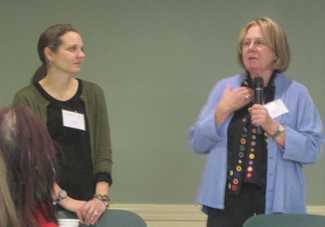 There were a couple of mother-daughter combos in the panels, such as Anne Rockwell and Lizzie Rockwell in the picture book panel. The next panel, "45 Years in Children's Books and Another 25 from the Next Generation" was another such duo. Rosemary Wells, beloved author of the Max and Ruby series of picture books, and her daughter, Victoria Wells Arms, who is the owner of Wells Arms Literary Agency. This was one of my favorite panels - both for the mother-daughter aspect of it, and also to see behind the scenes. I grew up reading the Max books - they were one of my favorites when I was learning how to read, and I read them to my daughters today. One of the best quotes from the panel came near the beginning from Ms. Wells. She was speaking about how difficult it is to get published nowadays, both because of the economic aspect of it, and because the competition is fierce. She said, "If it's not meant to be, it's not meant to be. . . . If it's meant to be, you will be read, you will be found and you will be published." This struck me as both realistic and hopeful. The reality is that most people who write a book won't get published. But perseverance, in addition to talent, is the key to success. Some other advice from Ms. Wells: - Don't overwrite. There's a small space on each page - only 3-5 lines - and your writing needs to be precise. E.B. White said, "Be clear and be short." - Tell a true story. The details might be changed, but the center of the story can be based on something true that the writer has experienced. - Do "writing to touch your reader's heart." - "Write for your reader." - Don't overreach. "I like a light touch and I think everyone else does too." Some advice from Ms. Wells Arms: - Every agent/publisher is looking for something new, something fresh. She can't sell a great idea if it's been done two dozen times. - "Certain projects pop out of whole cloth. But for the rest of us, it isn't so easy." Writing takes work. - "There always has to be another good idea to follow up the first one." Agents and publishers are looking to work with an author over the course of their writing life, not just one book. And it's not always the first book that's the breakout. - Agents have assistants who read their inbox, so they won't often recognize a project if it's been rejected and revised. - "If something's not working, try something else." If a book's been rejected by everyone, perhaps chalk it up to experience and write a new one instead. - She said she's "not into queries - don't understand them." A good resume is nice, but it's the writing that's important. Often, agents won't read the query letter first. They'll read the sample writing first and make their decision based solely on that. - Common mistakes in a query letter: - Saying that you've read it to your children and all their friends, and they love it. They're a biased audience, so of course they would love it. - Getting very wordy. An agent has very little time, so they aren't able to read a long introductory letter. - She highly recommended attending the SCBWI (Society of Children's Book Writers and Illustrators) conference as a great way of connecting with agents and editors. 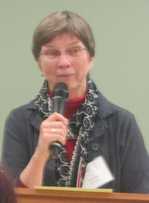 The final panel featured Connie Rockman, a freelance consultant specializing in children's literature. The theme of the panel was "Passages of Hope." Some key messages from Ms. Rockman: - "Writers light long fuses. . . . The hope that keeps writers going in this lonely struggle . . . is that possibility of attaining that kind of immortality, of lighting that long fuse that will spark the imagination of one child or future writer." - Quoting Ashley Bryan: "Doing what you love makes you more of who you are." - Quoting Kwame Alexander: "Children need to have a way to see themselves in the future." To have "faith in the possiblity of good - in other words, hope." 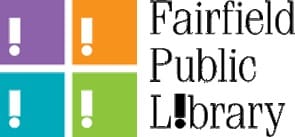 I would have paid to attend this conference, so the fact that it was free was really amazing. Conferences like this generally start at about $200 and only go up from there. I will end this post with the plea that the librarians made to the audience there - to support local libraries, because they really enrich a community and bring a love of literature to readers of all ages. You can become a Friend of Fairfield Library and help support the wonderful events they sponsor. I met writers there who had driven from hours away to attend. Events such as this are useful not only to the town itself, but to writers and readers from miles around. If not Fairfield Library, please support your local libraries. In this day of budget cuts to community programs, it's more important than ever that we, the people who benefit from the programs, reach out and give back to ensure that they will be there for future generations.
5 Comments
5/1/2019 03:12:21 pm
Hi Alison,
Reply
5/3/2019 03:17:39 pm
Hi, Peter!
Reply
Writing for children is bleeding troublesome; books for kids are pretty much as unpredictable as their grown-up partners, and they ought to thusly be agreed on similar regard. Hope to read more article and I will be back again soo to check more of your post. Thanks!
Reply
Leave a Reply. |
Who the heck is Alison McBain?I am a freelance writer and poet with over two hundred short pieces published in magazines and anthologies. Check out my 2024 writing challenge to write a book a week at Author Versus AI. For more info, please check out my "About Me" page. © Alison McBain. All rights reserved
Archives
July 2024
|


